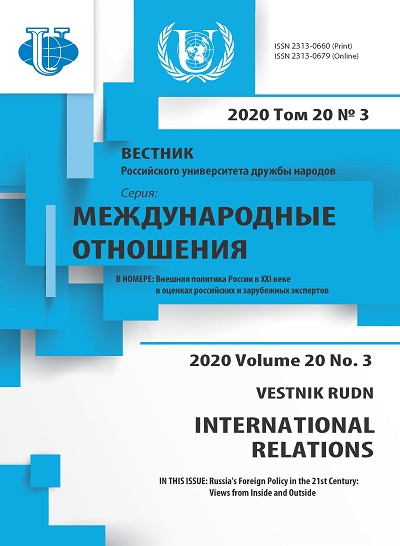USSR and the 1966 Coup d’État in Ghana: Based on Materials from Russian Archives
- Authors: Mazov S.V.1
-
Affiliations:
- Institute of World History, RAS
- Issue: Vol 20, No 3 (2020): Russia’s Foreign Policy in the 21st Century: Views from Inside and Outside
- Pages: 619-633
- Section: HISTORY OF INTERNATIONAL RELATIONS
- URL: https://journals.rudn.ru/international-relations/article/view/24632
- DOI: https://doi.org/10.22363/2313-0660-2020-20-3-619-633
- ID: 24632
Cite item
Full Text
Abstract
The article investigates the role of Soviet experts and diplomats in conceiving the economic policy of the government of Kwame Nkrumah and in elaborating a seven-year development plan for Ghana (1963-1970). Drawing on extensive documents from Russian archives, the author proved that the USSR Ambassador to Ghana had recommended Soviet economic recipes to President Kwame Nkrumah, ignoring Ghanaian realities and opportunities, - the introduction of a planned economy, the nationalization of large enterprises and banks, the establishment of state control over the main industries, and the creation of collective farms in the countryside. K. Nkrumah believed that with the assistance of the Soviet Union, Ghana would be able to successfully repeat its experience of rapid industrialization. The attempts to implement an unfeasible program have brought the economy of Ghana to the brink of collapse. Soviet economic and financial aid turned out to be ineffective. Most joint ventures remained costly long-term constructions due to errors in planning and supply. The economic collapse and falling living standards of the population ensured the success of the military coup on February 24, 1966 to a large extent. The leadership of the USSR faced a difficult dilemma. In the name of publicly declared values, ideological principles of the Soviet foreign policy, the military-police junta that ousted K. Nkrumah should not be recognized. Pragmatic interests (repayment of loans, retaining profitable bilateral trade, the ability to complete the construction of joint facilities) required the maintaining of relations with the junta. The author found that the reaction of the Soviet Union to the military coup was not consistent. At first, it was decided not to recognize the “reactionary”, pro-Western regime and to help K. Nkrumah regain power by force of arms. A Soviet ship was sent to the shores of West Africa with a cargo of weapons for his supporters. Soon the ship was recalled, and full-scale relations with the new regime were restored. Pragmatism has become superior over ideology reflecting a change in the Soviet African policy after a series of setbacks there.
About the authors
Sergey Vasilyevich Mazov
Institute of World History, RAS
Author for correspondence.
Email: s.mazov@mail.ru
PhD in History, Dr. of Sc. (History), Chief Researcher, Center for African Studies, Institute of World History
Moscow, Russian FederationReferences
- Biney, A. (2009). The Development of Kwame Nkrumah’s Political Thought in Exile, 1966—1972. Journal of African History, 50 (1), 81—100. doi: 10.1017/S0021853709004216
- Davidson, B. (1973). Black Star. A View of Life and Times of Kwame Nkrumah. London: Allen Lane.
- Legvold, R. (1970). Soviet Policy in West Africa. Cambridge (Mass.): Harvard University Press.
- Mazov, S.V. (2008). The Policy of the USSR in West Africa, 1956—1964. Unknown Pages of the Cold War History. Moscow: Nauka publ. (In Russian).
- Mazov, S.V. (2012). Kwame Francis Nwia Kofie Nkrumah. In: Davidson, A.B. (Eds.). History of Africa in Biographies. Moscow: Rossiyskiy gosudarstvennyi gumanitarnyi universitet publ. P. 612—622. (In Russian).
- Mazov, S.V. (2019). The Establishment of the Soviet-Ghanaian Relations, 1956—1960. In: Davidson, A.B. (Eds.). Africa in the Fate of Russia. Russia in the Fate of Africa. Moscow: Politicheskaya encyclopedia publ.
- P. 200—273. (In Russian).
- Voronin, A.L. (1997). In the Field of Foreign Policy. In: Fetisov, T. I. (Eds.). Premier Known and Unknown. Memoirs about A.N. Kosygin. Moscow: Respublika publ. P. 56—69. (In Russian).
- Nkrumah, K. (1964). Africa Must Unite. Moscow: Progress publ. (In Russian).
- Omari, P. (1970). Kwame Nkrumah: The Anatomy of an African Dictatorship. London: C. Hurst & Co.
- Rooney, D. (1988). Kwame Nkrumah. The Political Kingdom in the Third World. London: I.B. Tauris & Co Ltd.
- Smertin, Y. (1987). Kwame Nkrumah. New York: International Publishers.
Supplementary files










